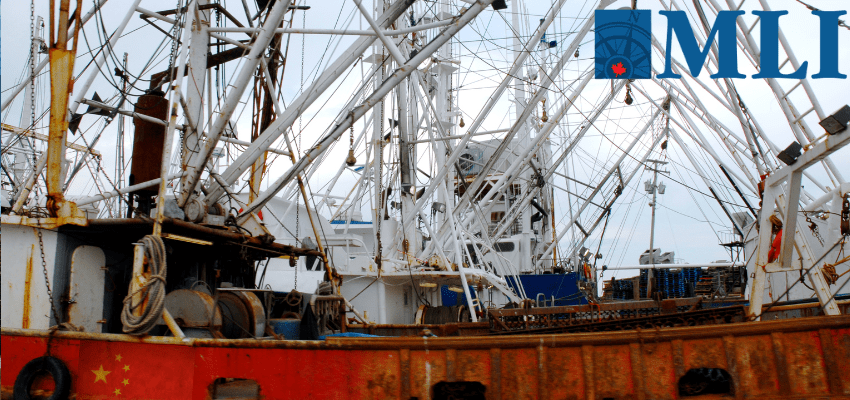This article originally appeared in the Spectator.
By Sarah Teich, October 11, 2024
Despite clear evidence of human rights abuses in China’s seafood industry, tainted products remain on Canadian shelves.
Last year, a four-year investigation by the Outlaw Ocean Project revealed the use of forced labour and other gross human rights violations in China’s seafood industry, including Uyghur exploitation. The violations span their operations on land and their operations at sea.
In 2020, the U.S. Department of Labor found that many deckhands on Chinese vessels “work involuntarily under conditions of coercion, fraud, intimidation or debt bondage.”
A 2021 report revealed 97% of crew members experienced debt bondage or document confiscation. Testimony and footage gathered revealed crewmembers being “beaten with metal pipes and threatened with knives by senior Chinese crew.” One Indonesian crewmember explained, “I was being restrained and hit. They beat every part of my body.”
Regular abuse and denial of access to medical care on numerous occasions has led to serious illnesses and deaths on board Chinese fishing ships. The Outlaw Ocean Project’s investigation identified 43 fatalities onboard the vessels, which is likely only the tip of the iceberg.
China’s government is closely linked to these violations, including by subsidizing companies with vessels implicated in human rights abuses. The Outlaw Ocean Project found that the Chinese government gave more than $17 million in subsidies to seafood companies where at least 50 vessels are implicated in fishing crimes or had injuries or fatalities onboard.
Meanwhile, Chinese seafood conglomerates supply hundreds of restaurants, grocers and food service companies in Canada, the United States, Europe and elsewhere.
Canada is heavily involved, and as such, should take decisive action. The U.S. already has.
As early as December 2022, the U.S. Department of the Treasury’s Office of Foreign Assets employed their Magnitsky Act to impose targeted sanctions on several Chinese nationals and entities for human rights violations perpetrated on Chinese fishing vessels. Two individuals, Li Zhenyu and Xinrong Zhuo, and the networks of entities they control, including Dalian Ocean Fishing Co. Ltd. and Pingtan Marine Enterprise Ltd., along with eight other affiliated entities, were sanctioned. The sanctions also identified 157 Chinese flagged fishing vessels in which these entities have an interest.
Canada should respond as well. One important tool that would protect Canadian markets from the entry of products tainted by gross violations of human rights are our targeted sanctions regimes. In March 2021, Canada passed the Special Economic Measures (People’s Republic of China) Regulations and implemented sanctions on four individuals and one entity with responsibility for gross violations of human rights committed against Uyghurs.
However, Canada has not yet implemented any sanctions in response to other human rights abuses committed by Chinese entities or individuals. Gross human rights violators in the Chinese seafood industry are particularly important targets, given the egregiousness of the conduct and the extensive connections with Canadian importers.
In December 2023, Human Rights Action Group and Uyghur Rights Advocacy Project filed a submission with Global Affairs Canada requesting that targeted sanctions be levied on seven Chinese entities in the seafood industry that use Uyghur forced labour in their processing plants. Despite our followups, no action has been taken.
On September 3, we filed a second submission, requesting targeted sanctions on eight additional Chinese entities and 16 individuals with responsibility for gross human rights violations committed on board Chinese fishing vessels, including forced labour and labour abuse of deckhands, physical violence amounting to torture, and wrongful deaths.
While Canada may not be empowered to stop these human rights violations, we can and should ensure that we are not complicit, and that products made with the blood, sweat and tears of their victims do not reach Canadian shelves.
Sarah Teich is a senior fellow at the Macdonald-Laurier Institute and co-founder, president of Human Rights Action Group and has been recognized as one of Canadian Lawyer’s Top 25 Most Influential Lawyers of 2024.






